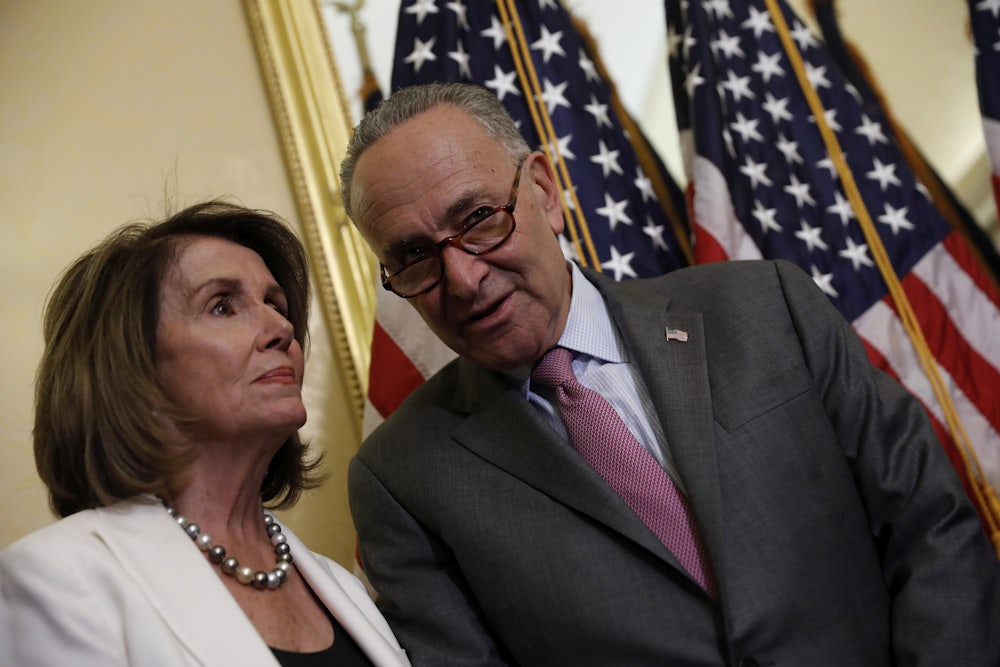There’s a long-running children’s comic strip called Goofus and Gallant, about one selfish boy and one virtuous one, that resembles a long-running political problem in Washington. Republicans (Goofus) act rashly and screw things up, and Democrats (Gallant) are supposed to be the upstanding citizens that fix everything. This creates an imbalance, giving anti-government Republicans carte blanche to savage the bureaucracy, on the expectation that Democrats will quietly make it right.
We’re seeing this Goofus and Gallant problem in action with the tax law passed at the end of the last year. All large bills inevitably contain drafting errors, typos, and glitches that cause unintended consequences. But a bill passed as swiftly and without deliberation as the tax plan was sure to multiply those problems, and that expectation has come true. As Politico reports, within the first two months of the tax law taking effect, dozens of mistakes have cropped up, some which could either assist or harm entire classes of taxpayers.
For example, a lack of clarity could allow hedge funds and private equity firms to sidestep a provision that would prevent them from counting earnings from their investments as capital gains instead of income—commonly known as the “carried interest” loophole, as capital gains are taxed at a lower rate than income—unless they held the investments for at least three years. The law exempts corporations from this rule but doesn’t specify what kind of corporations, leading hedge fund managers to rush to Delaware to create LLCs to duck the new restriction.
When will businesses be restricted from carrying forward losses to reduce their taxes? The bill contains two different deadlines. A typo in another section prevents developers from fully deducting expenses from commercial real estate improvements like remodeling for 39 years, instead of immediately, as was the plan. Real estate investors who thought they could claim a deduction for pass-through income have discovered they can’t unless they directly own real estate stocks, rather than through a mutual fund. And the so-called “grain glitch” could allow anyone who sells grain to cooperatives to completely avoid paying tax.
Republicans have an idea to clean up the law. They want to include the necessary changes in must-pass legislation to finish the government funding process for the year. Democrats would have to agree to that process, since they have enough votes to filibuster the bill in the Senate. John Thune, the number three Republican in the Senate, told Politico, “I think most of these fixes are going to be things that are widely supported … and hopefully that will win out with Democrats.”
In other words, Republicans recklessly passed a bill with all kinds of drafting mistakes, and now they want Democrats to agree to help them solve the problems. Democrats, on the other hand, were shut out of the entire process of the tax law and may not feel inclined to lend their votes to make it work better. Some have suggested that if Republicans want the fixes so badly, they should open up the entire law to changes.
There’s a history here. Democrats similarly had drafting errors in the Affordable Care Act, and asked Republicans for years to enable fixes. Republicans steadfastly refused, instead taking dozens of repeal votes and doing everything they could to undermine Obamacare. They even took some of these glitches to the Supreme Court, in an attempt to throw out large parts of the law.
These glitches mostly cost the government tax revenue, sow confusion in business administration, or make ordinary updates to small businesses too costly. There’s no real policy case to deny technical corrections. But there’s a significant political case. Going along with the fixes reduces what leverage exists for Democrats to have a real say in the tax overhaul for the very first time.
But is it in the nature of Democrats to take that opportunity? They are supposed to be the ones who believe in a strong, functioning government. And this creates a significant asymmetry. If one group always plays nice and the other doesn’t, the leverage will always accrue to the Goofuses. The Republicans don’t care about the consequences of their actions to the same degree and will always be willing to metaphorically shoot the hostage. Under President Barack Obama, they constantly used the filibuster to deny or delay policies with widespread support, and they were willing to let the debt ceiling lapse and threaten financial chaos to serve their ideological needs.
If Democrats aren’t willing to be as cutthroat as Republicans, then the game is rigged. One side simply has more tools to bend the system to its will. And as the Obama era showed, Republicans haven’t paid a price at the polls for their hostage-taking—quite the opposite. Turning politics into a zero-sum game has been rewarding for the party, which now has unified control of the government. It’s not clear that it would be equally rewarding for Democrats, whose supporters don’t have the same disdain for the government as Republicans do.
There’s a case for simply delaying any action on the tax glitches until after the midterms, at which point a new Congress—one in which the Democrats control the House of Representatives, at least—can make changes on its own terms, and make it retroactive to this tax year, minimizing the disruption. But it’s hard to fight one’s nature, and Democrats instinctually are fixers. Can they suppress their short-term impulse for good policy for a longer-term strategy that might reap yield greater policy? It’s a genuine conundrum, but one Democrats must solve in order to restore their political relevance.
